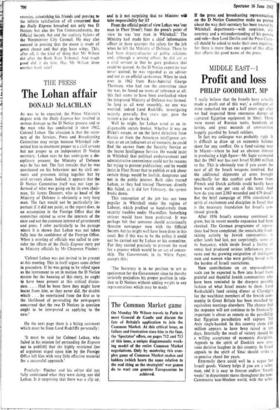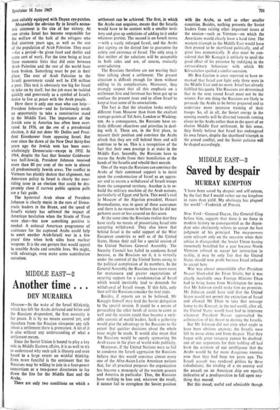Profit and loss
MIDDLE EAST-1 PHILIP GOODHART, MP
'I really believe that the Israelis have actually made a profit out of this war,' a colleague of mine remarked ten and a half years ago after we had inspected three enormous dumps of captured Egyptian equipment in Sinai. There were scores of Russian tanks, hundreds of lorries, and great mounds of ammunition happily guarded by Israeli soldiers.
In fact my colleague was probably right. It is difficult to draw up an economic balance sheet for any conflict. On a fund-raising tour in Miami—where he had an obvious interest in producing a high figure—Mr Sapir estimated that the 1967 war has cost Israel $1,000 million so far. This is obviously true if you count the cost of all the Israeli weapons involved. But the additional shipments of arms brought specifically for this conflict and flown from French and Dutch airfields could hardly have been worth one per cent of this total. And how do you cost 2,563 wounded and 679 dead? But the brief campaign of 1956 stimulated a spirit of excitement and discipline in Israel that is the necessary foundation for Israel's con- tinued growth.
After 1956 Israel's economy continued to grow, but in recent months expansion had been checked. The German programme of repara- tions had been completed; the remarkable fund- raising activity by Jewish communities fl other lands had lost, not surprisingly, some of its buoyancy, while inside Israel a feeling ol ennui had produced serious inflationary Fes- sures and the growing emigration of intelligent men and women who were getting bored v,;:h the burden of Israeli restrictions.
Now contributions on an unprecedented scale can be expected to flow into Israel from grateful and thankful Jewish communities who have been reminded in the sharpest possible fashion of what Israel means to them. Lord Rothschild's fund raising dinner at Claridge's for the wealthiest members of the Jewish com- munity in Great Britain has been matched by equivalent meetings elsewhere. The chance that the response will not continue to be financially important is about as remote as the possibility that Egyptian parachutists will capture Tel Aviv single-handed. In this country alone flO million appears to have been raised in ten days. Internally the result of victory should be a willing acceptance of economic discipline. Appeals to the spirit of Dunkirk now pro- voke derisive laughter in this country. In Israel appeals to the spirit of Sinai should strike responsive chord for years. Externally there could well be a vogue for Israeli goods. Victory helps if you are a sales- man, and it is easy to foresee endless 'Israeli weeks' in department stores throughout the non- Communist non-Moslem world, with the sales-
men suitably equipped with Dayan eye-patches.
• Meanwhile the obvious fly in Israel's econo- mic ointment is the size of her victory. At one stroke Israel has become responsible for the welfare of the bulk of the refugees who fled nineteen years ago, as well as the rest of the population of Arab Palestine. They must —for a period—be given food and shelter and some sort of work. For the time being at least these economic links that did exist between Arab Palestine and the rest of the world have been broken. Something must be put in their place. The cost of Arab Palestine to the Israeli government could well be £50 million a year. This task is obviously too big for Israel to take on by itself, but the job must be tackled quickly and generously as a symbol of Israel's desire to live at peace with the Arab people.
Here there is only one man who can help— President Johnson—and he fortuitously needs an opportunity to take a constructive stand in the Middle East. The importance of the Jewish vote in America has often been over- rated. In 1956, on the . eve of a presidential election, it did not deter Mr Dulles and Presi- dent Eisenhower from opposing Israel. But ever since the dawn of the New Deal thirty-five years ago the Jewish vote has been over- whelmingly Democratic—except in 1952. In 1964, despite the fact that Senator Goldwater was half-Jewish, President Johnson received more than 80 per cent of the vote in almost all predominantly Jewish areas. The conflict in Vietnam has plainly shaken that alignment, but American policy to Israel is clearly the over- riding issue in an election that could be des- perately close if current public opinion polls are a fair guide.
The hysterical Arab abuse of President Johnson is clearly music in the ears of Demo- cratic leaders in the Bronx, and the speed of Israel's victory has softened the impact of American hesitation when the Straits of Tiran were shut—but now something positive is needed. A colossal American programme of assistance for the captured Arabs could help to avert another Arab-Israeli war in a few years' time when both sides have nuclear weapons. It is the one gesture that would appeal to sensible Arabs and sensible Jews. We might, with advantage, even make some contribution ourselves.



































 Previous page
Previous page